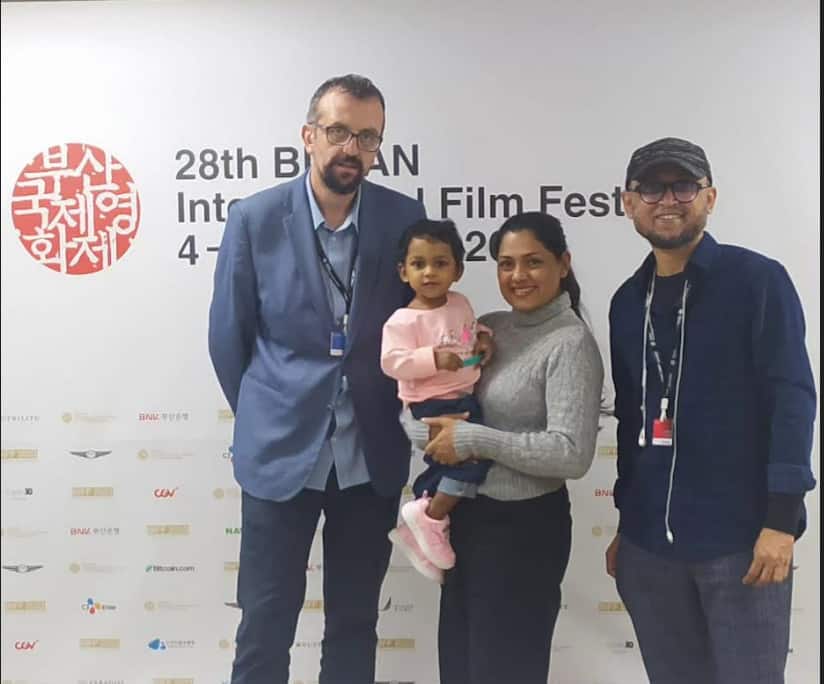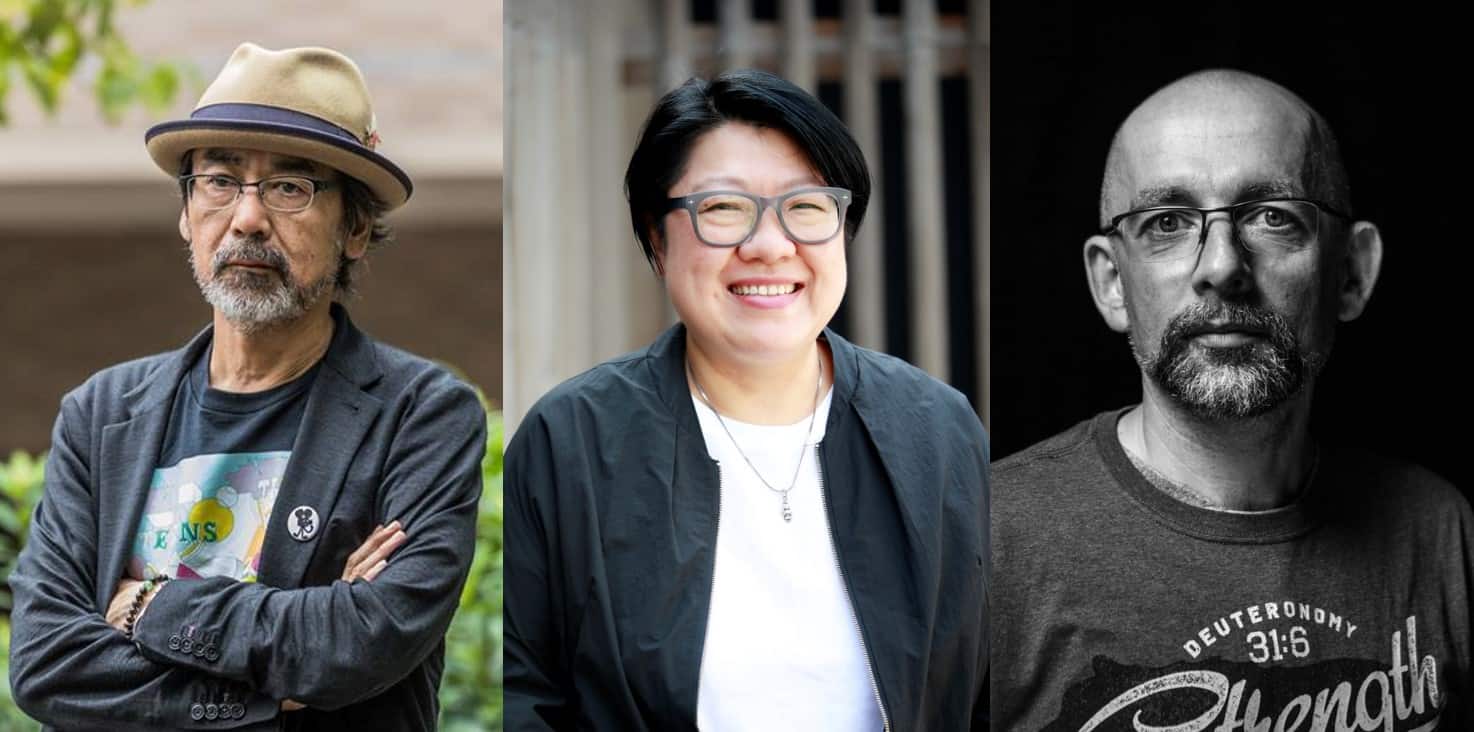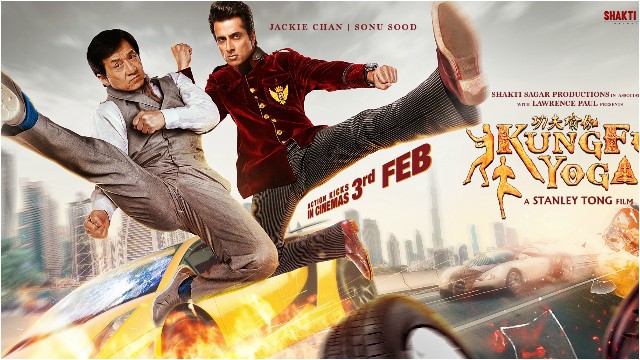Farooki is a Bangladesh-born film director, producer, and screenwriter. He directed some of his notable works which include the feature films Third Person Singular Number (2009), Television (2012), Ant Story (2013), DOOB (No Bed of Roses) (2017), Saturday Afternoon (2018). His film Television was the closing film at the 2012 Busan International Film Festival and received awards at several international film festivals. In 2016, he served as a jury member for the Sonje section at the BIFF. No Land's Man (2021) was an 2020 APM Selection and premiered in the Jiseok Section at the 2020 Busan International Film Festival.
Nusrat Imrose Tisha is one of Bangladesh's top actors who got rare success in both fronts: audiences and critics. She got rave reviews from Variety, The Hollywood Reporter and Screen Daily for her performances in Doob (No Bed of Roses), Television, and Third Person Singular Number. She is the lead actor and co-writer of the film Something Like An Autobiography.
On the of “Something Like an Autobiography” screening at Busan International Film Festival, we speak with actress Nusrat Imrose Tisha and director Mostofa Farooki about Farooki's first endeavor as an actor and working with Tisha in that capacity, how close to their actual life are the events portrayed in the film, Bangladeshi cinema, Chorki and OTT, and many other topics.
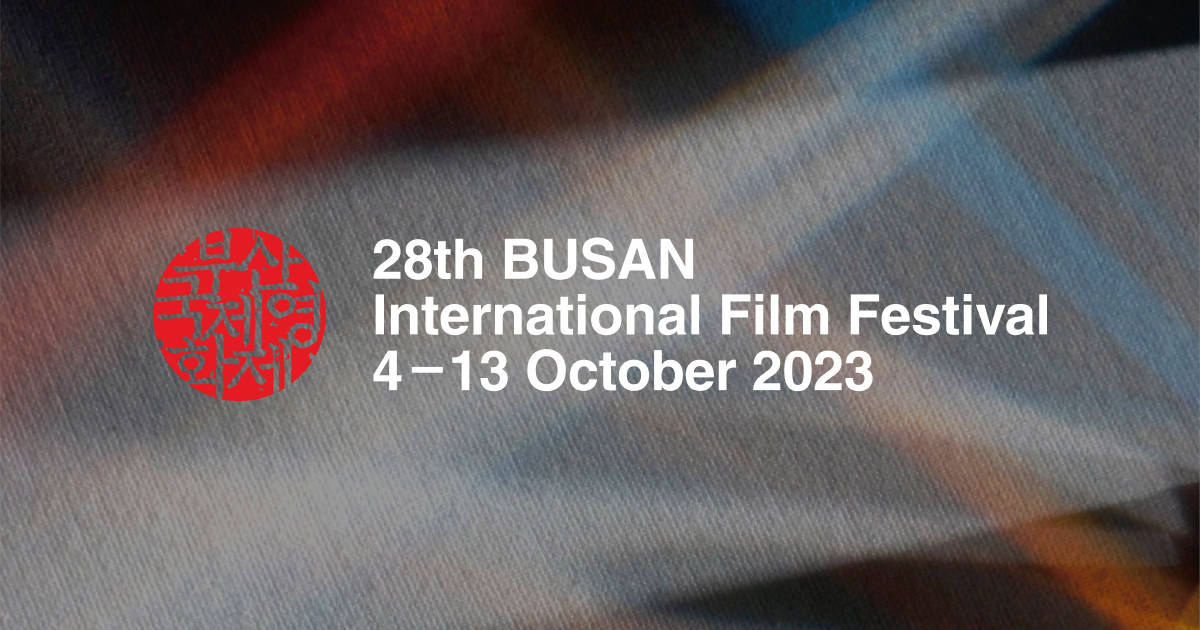
I have to start with this question, Mostofa. This is your first acting credit, how did you make this decision?
Farooki: Acting is a very vulnerable process. In front of the camera, you are alone, taking care of yourself. In front of the whole wide world, you are so alone. It always creates a sense of vulnerability and I was sensing this feeling would come. Also to expose one's own emotion in front of a camera is always a vulnerable thing. Therefore, initially I was not sure whether to act or not, although when Tisha and I were writing the script together, we knew that this had to be us. However, I was shaky when it came to making the decision. She was constantly pushing me and telling me, “This is a film you can make once in your lifetime. And in this film, if someone else performed in the role, the result would be completely different from us”. I still didn't decide but finally, Chorki's CEO and Tisha's pressure made me say, ‘let's do it'.
Tisha, how was the experience for you, acting besides him for the first time?
Tisha: Oh my God, I was so nervous (everybody laughs). Jokes apart, I am so happy that he is my co-artist and I am the only artist who got the opportunity to work with him. It was a very nice experience. I felt as if I was not acting in a film. Rather it was like we were living a normal life at home and someone was just secretly filming that.
So, who was giving instructions to whom?
Farooki: For sure, the instructions were coming from the director. But of course, after every shot, I was asking her how she felt, if it was ok. She has been performing for a long time, and not just performing, but performing on a different level. That is why I trust her opinion, her verdict. So, to achieve self-confidence, most of the time, after every shot, I asked her whether it was ok, and also my brother who was on the monitor, observing what I was doing. I was always asking, and she was always saying the right thing.
Tisha: Yes, since I was involved with the script too, it gave me some perspective to see things from a different angle.
Is the story of the film close to your reality?
Farooki: As the title suggests, ‘Something like an Autobiography'. For sure, not an autobiography. One festival director saw the film and asked me something very interesting afterwards. “Farooki, I know some parts are real but some other parts were really striking to me. I need to know if those parts are fake or real” And I replied to him, “the parts that you are talking about are neither fake nor real”.
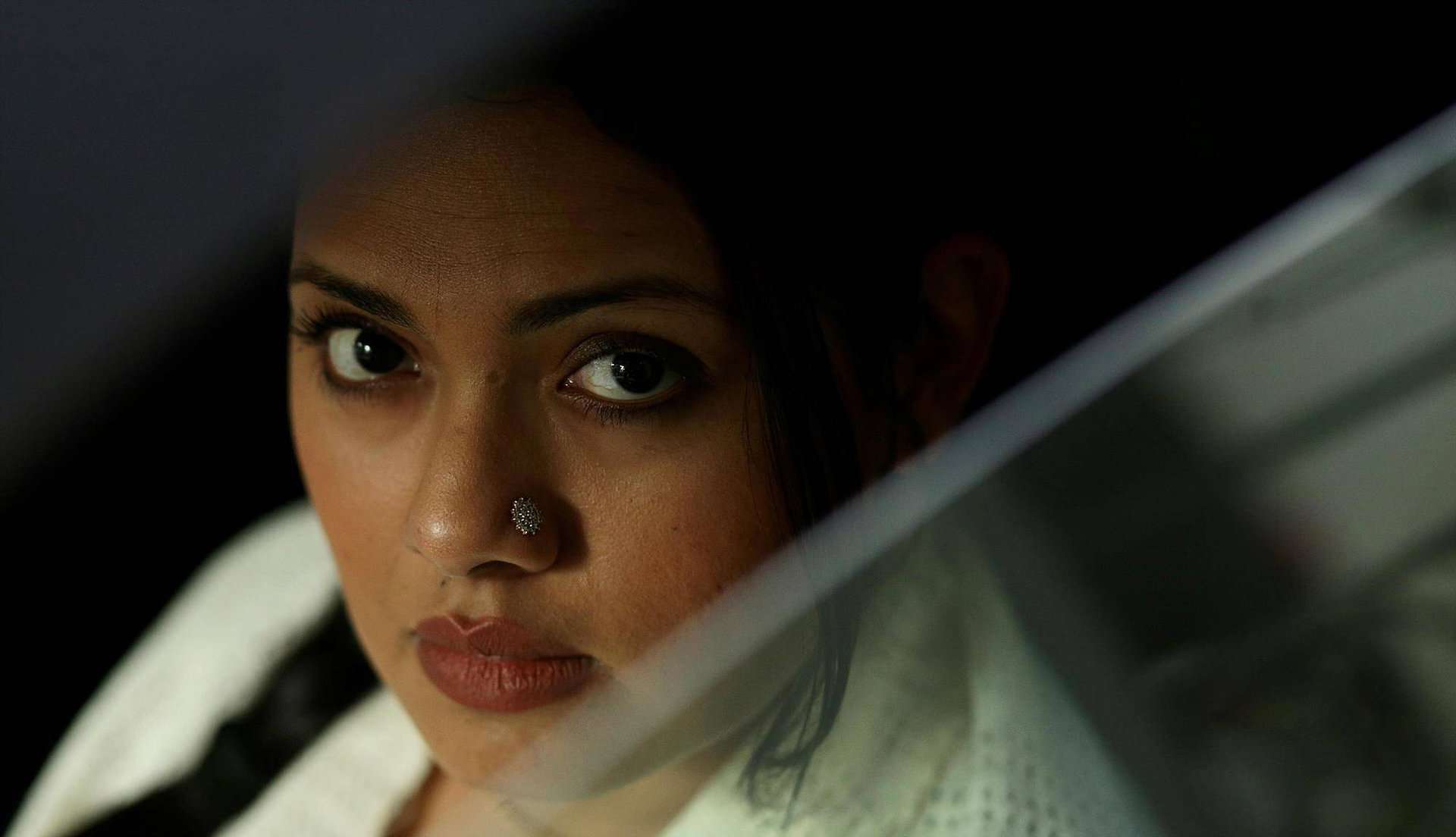
But how close are the characters in the movie to who you are in real life?
Farooki: In terms of characterization, we are pretty close to our real lives, but of course, all the incidents depicted in the movie are not entirely factual.
Tisha: It was constantly and seamlessly mixing our real experiences with fictional elements!
So, where did the inspiration for the incidents come from?
Farooki: As I was saying, maybe the film is not 100% factual but it is 100% truthful. We knew that we were making a fiction film, but we decided to pull the strings from whatever happened in our lives. And then we created a fiction, we created a story, a structure etc. But if you ask me, and without giving spoilers, for every scene of the film, I can show you what the inspiration was in real life. I can clearly say from where we took it and how we converted it into the movie.
What about the corruption shown in the film?
Farooki: The answer is the same. As you saw, the movie starts in a very personal space but in this state system or social system we are living in, nothing is personal. Your love is not personal, your dreams are not personal, your baby is not personal. Everything is political. And how politics influence even the smallest of things, the smallest details of life, that can be seen in the film. However, we wanted to chronicle the journey of a baby, but in doing so, we also wanted to pull the social and political fabrics of the society that we live in.
So in the end, it is a political film?
Farooki: It is a love story, but every love story is political
This pressure the protagonists feel in the movie, for being celebrities, do you also feel it in your personal life?
Farooki: Yes, of course. Tisha felt it more than me actually. The national question for Tisha has been for some time, “when are you taking a baby?”
Tisha: When I was writing the script, this is what I had in mind. All these questions were in my mind. This was the most common question for me. For a woman, question never ends. When are you getting married? Once you are married, when are you taking baby? When you take a baby, you thought the question would end? No, you are wrong.(laughter)
It never ends right?
Farooki: To be honest, like in the film, the questions never end for a woman.
And how was the casting process regarding the rest of the actors?
Farooki: When I cast, I always try to look for the eyes. I feel I need certain eyes for each character. All of the actors I cast in this film were amazing. I always believe casting the right people is 70% of the job. The rest 30% is the right brief for the actors. If the actors are intelligent, and if the director can brief properly, I think the job is done.
I felt that the protagonist has to swallow his own pride for the sake of his family. Is that what happens in real life in your opinion?
Farooki: Yes… The father or mother, in this societal structure, always has to accept defeat because they are concerned about their children. And they always put their head down, just because they are concerned about their kids. Even a rebel bows down when the question of their children's safety arises. This is a tragedy for the parents in the social and political structure; the parents are always like lilliputians against the Gullivers.
There is a part of the movie I am not sure about. The protagonist's admirer goes out of the apartment but then she calls him back. Why?
Farooki:I don't want to give a spoiler here, but I can tell you one thing. Whatever both of us did, me and she as characters, we had to do for the safety of our family. It is evident throughout the film.
Can you give me some details regarding the cinematography?
Farooki: We wanted the film to look very very intimate. Together with DP Tahsin Rahman, we tried to come up with a visual style that feels very intimate, very personal.
Which was the most difficult scene to shoot?
Farooki: Without giving a spoiler, there is one scene where we both had an emotional breakdown. It was very very tough, and interestingly, we shot this scene only once, no second take. We edited to make the scene into maybe 3 minutes but we shot it for 7 minutes. We knew that we cannot recreate it. If we tried, something else would come out, but this emotion would be gone. I was very scared about my performance in that particular scene, but everything was so easy when I looked at Tisha. When I looked at her eyes, when I saw her emotional and vulnerable eyes, I became emotional also. I started to feel like, ‘Oh my God, how will she live this life without me' and that grabbed me completely.
Is the same feeling you were channeling too?
Tisha: Definitely, when I saw him in this situation, I started to think what would happen to him, what can I do for him, what should I do for him. I forgot that I was shooting a movie, I forgot that I was playing a character, I forgot everything, I just thought that if he is in this situation in real life, what will happen to me, what would be my reaction?
Farooki: I felt that electromagnetic connection, while shooting that scene.
How was your approach towards the editing?
Farooki: The main editor was Momin Biswas, but I was always in the editing room. I love being present in the editing sessions. For every auteur filmmaker, it is very important to carve their own editing rhythm for a particular story.
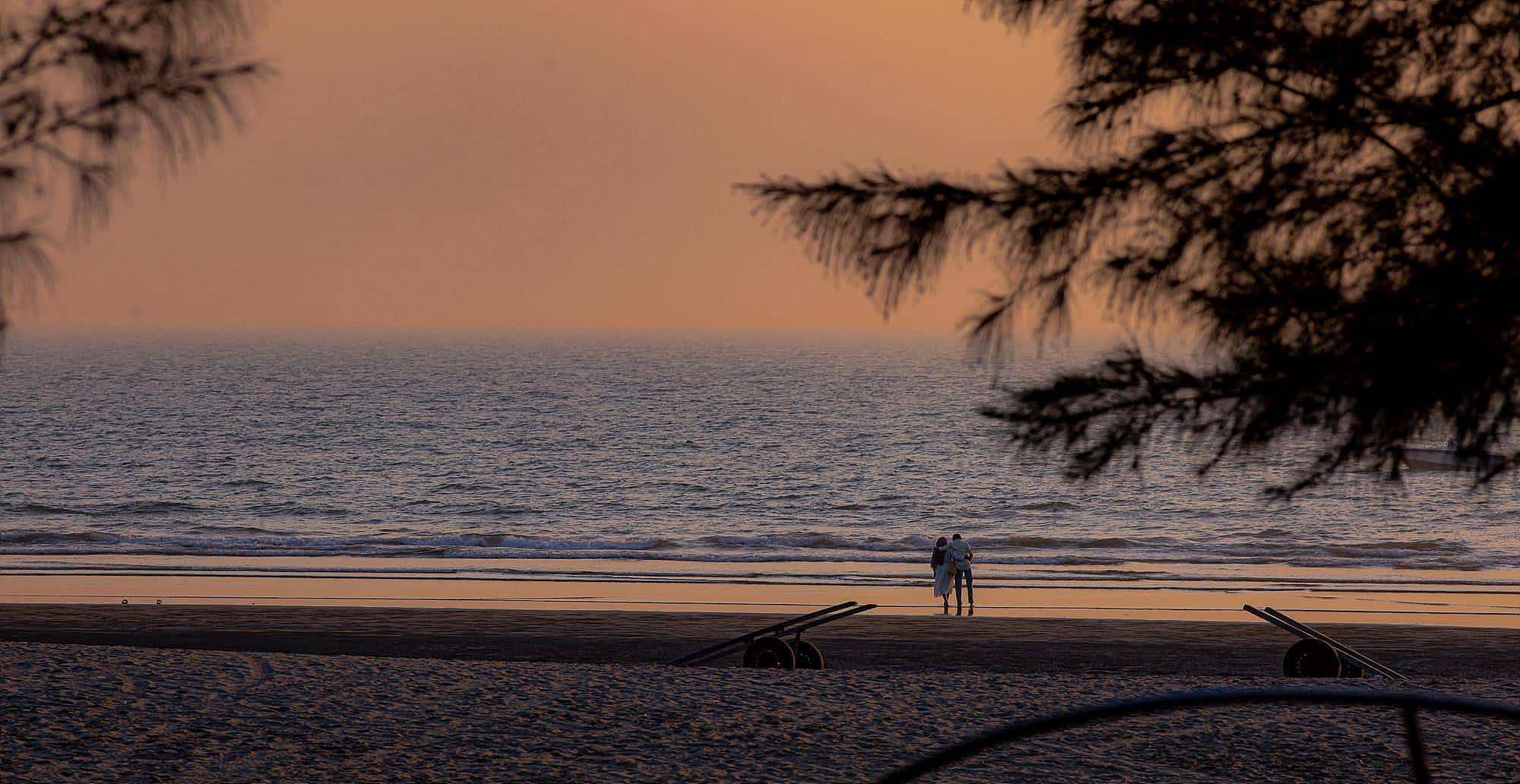
Most movies nowadays tend to be overlong. Not your movie though. Can you tell me a bit about that?
Farooki: While I was editing, I knew that we were not going to make a long film, we were going to do an 80-90 minutes film. When I did the first cut, the movie lasted for more than 100 minutes, but I decided to trim it down and make it more precise and that is how we ended up with 82 minutes.
Tell me a bit about your collaboration with Chorki.
Farooki: I really want to thank Chorki for producing it, as part of their 12-film project. They are producing them under a banner called Ministry of Love. The reason we are doing it is simple, we realized that in South Asian OTT platforms, most of the productions are crime thrillers, action thrillers and most films and series start with ‘who killed him or her?' I understand that this is a safe strategy to hook and hold the impassioned ever scrolling audience. But then we thought, if we all keep doing this same thing, what will happen to great character studies, what will happen to great human dramas, great relationship dramas. That is why they initiated this project titled Ministry of Love, where they are mostly going to deal with human relationships, love etc. I am doing two titles for this project, one is “Something Like an Autobiography” and the other one is. “Last Defenders of Monogamy”. The shooting is done for my next project. Now 11 other filmmakers are making 10 other films.
What is the situation with the Bangladeshi movie industry at the moment?
Farooki: We are constantly progressing, Variety has reported that, since 2012, Bangladeshi cinema is constantly seeing an uptake, which is continuing. But regarding policy, we don't want much support from the government, but we want the government not hindering our efforts, not blocking our efforts. If we can have a proper policy, creative freedom would be ensured and producers and distributors would get their fare share from the revenue the films generate. Because the sharing of revenue is not yet proper and just, in Bangladesh. If this changes, I am sure Bangladesh will be an amazing cinema-making country.
And for you Tisha?
Tisha: This is my first film after Covid and after becoming a mom. Basically, I am a very positive person and I am hopeful about Bangladeshi cinema. Day by day, budgets are increasing, more films are being produced, and everyone is doing a great job and many young directors are coming out and they are great. I am sure the industry will go in the right direction.
So, do you think you will be acting together again in the future?
Tisha: Farooki has already received so many acting offers, everyone wants to work with him (laughing). However, I want him to be a very exclusive actor, working only with me (laughter).
You think it would be easy for you getting directions from someone else, as an actor?
Farooki: Acting is a great performing art but I feel like I am not made for that, because it is super stressful being an actor. Being in front of the camera and taking the world all by yourself is a stressful job.
Tisha: He can dominate actors and actresses but he cannot be dominated himself, I think (laughter)
How was the reception of the film by the Busan audience?
Farooki: Amazing as you have seen! After the screening and the Q&A and post Q&A, people showered us with their love. All the pains we went through before making the film and while making the film, we completely forgot. Now we only have happy memories.
Will the film open in Bangladesh?
Farooki: It will be released on Chorki pretty soon.
Are you happy with that, having the film released on OTT and not on theaters?
Farooki: If I have to be honest, as a filmmaker, everyone wants to be in the theatre. And I am a theatre man. I started my career on TV, but all my feature films were released in theaters. Thankfully, Bangladeshi audience want to see my films, and even though they are not mainstream films, they still flocked the theaters, which is amazing. But you know what I have been through, during the last few years in Bangladesh and I am tired and sick of it. So now, I am happy that the film is releasing, and the audience will be able to watch it. I am having dialogue with my audience again, and that is making me happy, despite the platform. Every filmmaker wants their films to be in the theater. But the theater climate is changing and theaters will probably be taken over by blockbusters, theme park movies, movies that you do not need to think about much when you are watching. If you take the big Hollywood films from the 70s and 80s for example, you have great stories, great characters, but those days are probably gone. Maybe not entirely, but definitely fading. So maybe now people will have more chances to watch great stories and great characters in OTT, in their own time. It is unfortunate, but times change…
Did you shoot differently, knowing that the film will screen in OTT?
Farooki: One may say that I had this in my mind when I was shooting, but even if I was shooting this for theatre, I would shoot it in the same intimate and personal way, because of the story.
So, when will it be on Chorky?
Farooki: It is going to Jio Mami Mumbai film festival later this month and it will probably play in a few more festivals, but it will not travel a lot. Because I am impatient, I really want the audience to see my film.
Tisha: The “baby” needs to be delivered (laughter)


